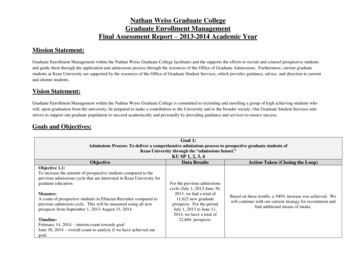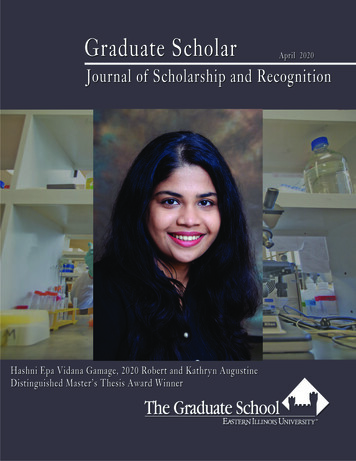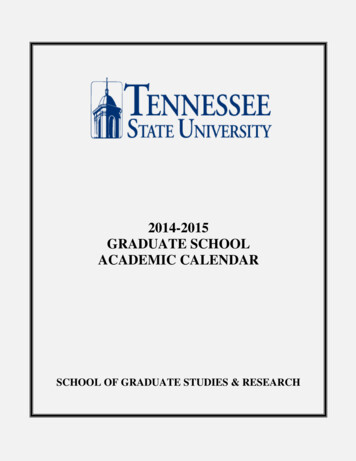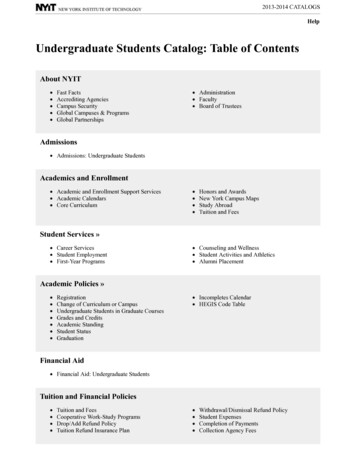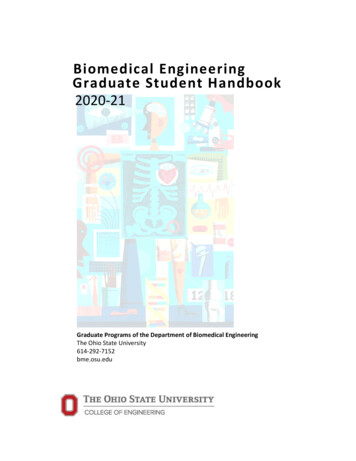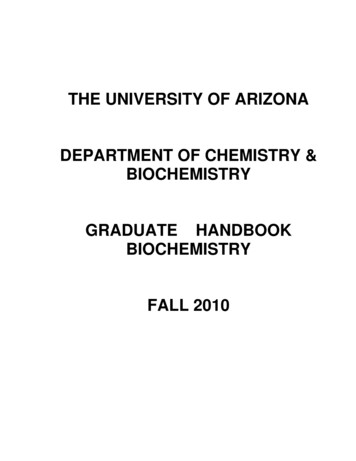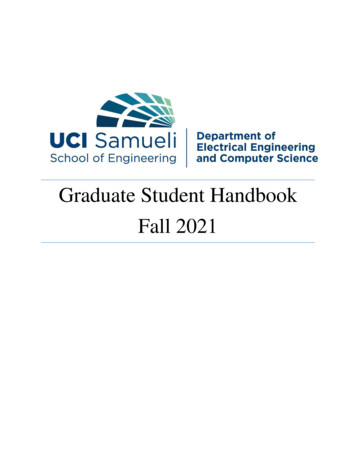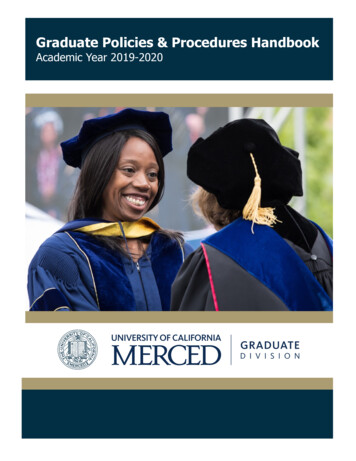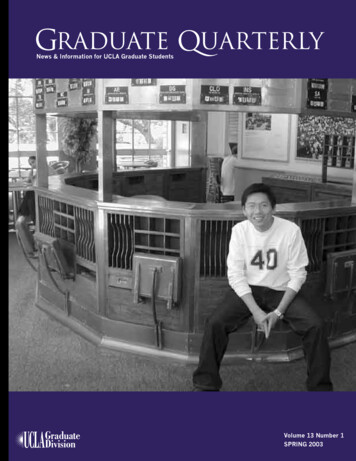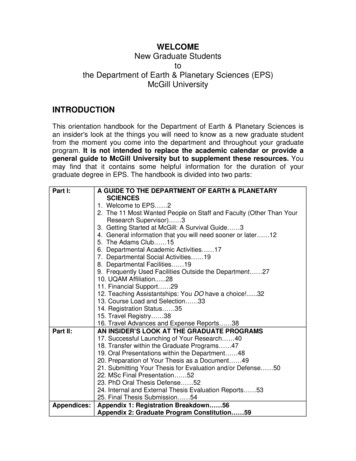
Transcription
WELCOMENew Graduate Studentstothe Department of Earth & Planetary Sciences (EPS)McGill UniversityINTRODUCTIONThis orientation handbook for the Department of Earth & Planetary Sciences isan insider's look at the things you will need to know as a new graduate studentfrom the moment you come into the department and throughout your graduateprogram. It is not intended to replace the academic calendar or provide ageneral guide to McGill University but to supplement these resources. Youmay find that it contains some helpful information for the duration of yourgraduate degree in EPS. The handbook is divided into two parts:Part I:Part II:Appendices:A GUIDE TO THE DEPARTMENT OF EARTH & PLANETARYSCIENCES1. Welcome to EPS 22. The 11 Most Wanted People on Staff and Faculty (Other Than YourResearch Supervisor) 33. Getting Started at McGill: A Survival Guide 34. General information that you will need sooner or later 125. The Adams Club 156. Departmental Academic Activities 177. Departmental Social Activities 198. Departmental Facilities 199. Frequently Used Facilities Outside the Department 2710. UQAM Affiliation.2811. Financial Support 2912. Teaching Assistantships: You DO have a choice!.3213. Course Load and Selection 3314. Registration Status 3515. Travel Registry 3816. Travel Advances and Expense Reports 38AN INSIDER’S LOOK AT THE GRADUATE PROGRAMS17. Successful Launching of Your Research 4018. Transfer within the Graduate Programs 4719. Oral Presentations within the Department 4820. Preparation of Your Thesis as a Document 4921. Submitting Your Thesis for Evaluation and/or Defense 5022. MSc Final Presentation 5223. PhD Oral Thesis Defense 5224. Internal and External Thesis Evaluation Reports 5325. Final Thesis Submission 54Appendix 1: Registration Breakdown 56Appendix 2: Graduate Program Constitution 59
ACKNOWLEDGMENTSA note of thanks is extended to those who contributed to assembling thisdepartmental document, namely, Sandy Archibald, Jim Clark, David Dolejš, AlexFitzpatrick, Martin Gauthier, Glenna Keating, Anne Kosowski, Steeve McCauley,Rob Marr, Michael Mlynarczyk, Alana Olson, George N. Panagiotidis, JeannePaquette, Glenn Poirier, and A.E. ("Willy") Williams-Jones. Subsequent editionshave been updated by Andrew Hynes, Crystal Mann, David Dolejš, KristyThornton, A.E. ("Willy") Williams-Jones and Don Baker.Members of the department who have suggestions for modifications and/oradditions to the handbook should e-mail them to Kristy Thornton(kristy.thornton@mcgill.ca).IMPORTANT NOTEPlease note that this handbook is an EPS-specific supplement and does notreplace the Graduate and Postdoctoral Studies Calendar (found )orthePoliciesandProcedures (found at http://www.mcgill.ca/gps/policies). You are responsible forreading and understanding the official procedures, rules and regulations aspresented in those documents. If there is anything that is not clear, please askthe Graduate Director.PART I:A GUIDE TO THE DEPARTMENT OF EARTH AND PLANETARYSCIENCES (EPS)1.WELCOME TO EPSYou have joined a dynamic scientific group in our department that is ready tosupport your research efforts as a new graduate student. Faculty, staff andstudents will do their best to make your transition to McGill as smooth aspossible. Feel free to ask for advice, particularly from your fellow graduatestudents in EPS.If you are an international graduate student new to the Department and toCanada, we extend an added welcome. Former graduate students MichaelMlynarczyk and David Dolejš have compiled a survival guide for livingin Montreal and getting started in your graduate degree (Section 4). Although thesurvival guide has been specifically targeted at newcomers to Canada, Canadianstudents from outside Montreal or outside McGill may also benefit from it.2
2.THE 11 MOST WANTED PEOPLE ON STAFF AND FACULTY(OTHER THAN YOUR RESEARCH SUPERVISOR)The human resources within the department will be invaluable to you throughoutyour graduate program. They provide an outstanding atmosphere of support for aproductive academic life as a graduate ProfessorDon i NinnoBrigitteDionneGeorgePanagiotidisLang Shi10. IsabelleRicher11. Anna Jung3.PositionChair, fearlessleader of ourdepartmentDirector ofGraduate StudiesAdministrativeAssistantStudent AffairsCoordinatorFST Manager(Expense Reports)Timetable sMicroanalysisLaboratoryAtomic Absorption(AA) FacilityICP-MS FacilityOfficeFDA 231E-mail addressandrew.hynes@mcgill.caFDA 310Ext6768or58847485FDA 2393490anne.kosowski@mcgill.caFDA 2386767kristy.thornton@mcgill.caFDA 238A4626nancy.secondo@mcgill.caFDA 2386767angela.dininno@mcgill.caFDA 209A1724brigitte.dionne@mcgill.caFDA 0063489McHarrB08FDA er@mcgill.caGETTING STARTED AT McGILL: A SURVIVAL GUIDE FORNEW AND INTERNATIONAL GRADUATE STUDENTSThis section serves as a stepwise chronological guide to the essential steps thatyou will need to take upon your arrival in Montreal. Items that pertain specificallyto international students are marked with an asterisk. You will need to register atthe university, open a bank account, arrange for health insurance, acquire asocial insurance number (SIN), and find a place to live. Guidelines are given inthe booklets: “International Student Handbook” and “Welcome to McGill”, whichare available from the International Student Office located in the Brown Building.The International Student Office located in the Brown Building offers a range ofservices, including providing information about Canadian visas, studentauthorization and immigration procedures. For more information on theirservices, please see their website at http://www.mcgill.ca/internationalstudents/.3
A map of McGill University (online version at http://www.mcgill.ca/maps/), a mapof downtown Montreal and a metro subway guide, which is available at any metrostation, will all be helpful to you. They are also sold in the “Travel” section on the3rd floor of the McGill Bookstore (3420 McTavish Street).UNIVERSITY REGISTRATION & FINANCIAL ARRANGEMENTSMinervaMinerva is McGill’s online administrative system. It records your personalinformation, grades and fee information. Your 6-character PIN number is initially“yymmdd” where yymmdd is the year, month and day of your birthdate, but a newPIN should be chosen right away. It is up to you to update your new address inMontreal on this system as soon as possible under the “Personal Menu”.Otherwise, any hard-copy documents from McGill will be automatically sent toyour address prior to arriving at McGill. The “Student Records” menu allows youto view information on your grades, and request official transcripts, and otheracademic-related information. You may also view your student account and printtax forms from the “Student Accounts” menu.Initial SetupVisit the main office, FDA, Room 238. You will be given an incoming studentpackage that includes some of the forms you need to get started. The rest mustbe taken care of online through Minerva. These include:You will need to provide us with your address and phone number (kept in yourfile in case of emergency), as well as the names and amounts of anyscholarships or bursaries that you have for the coming academic year. This isdone using the EPS Registration Information form. No need to include theGraduate Student Stipend or Teaching Assistantships that the EPS Departmentpays you. We are only looking to find out any additional/outside sources offunding. You will be asked to fill out one of these forms each year.The Cobbles/Pebbles Account Application form will enable you to access thecomputers and printers that are on our departmental network, such as those inthe computer lab in FDA 209. Please fill in the top part of the form and return iteither to the main office or directly to our systems administrator Brigitte Dionne inFDA 209A. More information is available in Section 8 of this handbook.All teaching assistants at McGill are part of the AGSEM union. You will be askedto fill out and sign an AGSEM Union Membership form for each teachingassistantship that you are assigned (one in the Fall and one in the Winter, and4
possibly one in the Summer). As a new student you will be assigned a TAshipand informed of which course it will be. (In later semesters, you will get to applyfor the courses you want.)If you are an international student and do not yet have a Social InsuranceNumber (SIN), you will need to get one. Follow the instructions on obtaining yourSIN outlined in the next section, and fill out the Employment Contract providedin your welcome package. This is one of the documents that you will need inorder to get a SIN if you do not already have one. Fill out the top section and signat the bottom, then return the form to the main office and we will fill out thebottom and have the Chair sign it. We’ll let you know when your form is ready foryou to pick up so that you can bring it with you to get your SIN.To set up your salary payments, please see Anne Kosowski, our administrativeassistant. She will have some forms for you to sign and will discuss tuitionpayments with you. If you are an international student, please bring your studentvisa and/or work permit to Anne as a photocopy of it is needed for your file.You will also need to fill out your direct-deposit banking information on Minerva inorder to receive payments. This form can be found under your Student Menu Student Accounts Menu Direct Deposit Bank Account. Be sure to fill out bothparts (“Bank account used for student-initiated payments” and Bank accountused for payroll-initiated payments”), as the first is for fellowships and the secondis for the rest of your payments (teaching assistantships and graduate studentstipends). You cannot receive any payments until this information has beenentered.Other useful information can be found in the course calendar and GeneralInformation, Regulations and Research Guidelines, and other documents allavailable online at http://www.mcgill.ca/gps/policies/.Course selectionConsult the course listing and descriptions for the current academic year.Undergraduate course descriptions are listed by departments in the McGillUniversity course calendar (available in the main office) and can be downloadedfrom the McGill website at http://www.mcgill.ca/courses/. See the programinformation for Earth & Planetary Sciences (under “Academic Units”) for therequired number of credits. The first step, which is the responsibility of thestudent and should be done within a week of your arrival, is to consult withProfessor Don Baker (EPS Director of Graduate Studies) to discuss therequirements of your program and ensure that you understand them. Consultwith your research supervisor to select your courses, then register on Minerva.5
RegistrationRegistration is done through Minerva (http://www.mcgill.ca/minerva-students/),the web interface to McGill’s database. The deadlines and late registration feesare given in the course calendar under “General Information, Regulations andResearch Guidelines Calendar of Dates”. You may register for the nextacademic session through Minerva from any computer with internet access. Yourstudent number and PIN are necessary to log into your account on Minerva.Once you have logged in, click on “Student Menu”, then “Registration Menu”, andfollow the steps listed to register (either by checking the box in the Select columnand clicking the Register button while in the “Look Up Course Sections” menu,or by adding the course CRNs into the “Quick Add/Drop Menu”.In order to avoid the late registration fee all students must register forREGN RCGR (the Registration Confirmation course) in both the Fall(CRN 2334) and Winter (CRN 2262) terms. For further information regardingrequired courses, please Section 13 on Course Load and Selection.Computer network accountTo gain access to a computer network account and get your name on thedepartmental emailing list, follow the instructions in Section 8 under Computing.EPS entry codesSee Kristy in the main office for the entry codes to the computer room, loungeand photocopier room (Section 5).McGill Student ID cardA few days after your registration, the Registrar’s Office will be able to issue youa McGill student ID card. Starting September 1, you can obtain your student cardat Service Point (corner of Sherbrooke St and McTavish). You will need to bringyour student ID number (e.g. given in your letter of acceptance), one piece ofphoto identification (e.g., passport, driver’s license), as well as a documentshowing proof of citizenship (for Canadian students) or proof of legal status (forinternational students) if you have not already mailed it in. You will be registeredfor health insurance (International Student Health Insurance Plan or through thePost-Graduate Students’ Society; see item below on health insurance). Your newstudent ID card also has a bar code for library access and the sports facilities.Expect to wait in line for about one hour.6
Fee paymentYou are required to pay university fees (e.g., tuition, student society). You mayaccess information on the amount due, as well as the breakdown of the feesthrough Minerva on your Student Accounts menu. Payment of fees can be donefrom your bank, at a banking machine (ATM), through telephone/internetbanking, by pre-authorized debit (e-cheque, see http://www.mcgill.ca/studentaccounts/e-bill/ for information on setting this up), by mail or by wire transfer.When paying by mail, cheques, money orders or bank drafts should be madepayable to "MCGILL UNIVERSITY" in Canadian funds. Please ensure that yourfamily name and student number are written on the front of the cheque.If you are expecting a major scholarship (e.g., NSERC, FQRNT, Tomlinson) andhave not received it yet, or you simply do not have the money at the moment untilyou have had the chance to build some up from your salary as a graduatestudent, you may apply for a fee deferral on Minerva. This will allow you to holdoff on paying your fees until the beginning of the following semester withoutincurring any penalty. Simply go to Student Menu Student Awards andFinancial Aid Defer Payment of Tuition and Fees, and choose the option thatapplies to you. Unless you have one of the scholarships listed, the third option isthe most accurate ("Graduate Students – McGill awards paid in installments (i.e.stipends or fellowships)"). More information on this is available *Open a bank accountTo receive direct payment of your teaching assistantship and graduate studentstipend, you will need to open a bank account. The major banks in the vicinity ofMcGill are: the Royal Bank of Canada (branches on McGill College, the corner ofSherbrooke and Peel, and the corner of St-Catherine and Stanley), Bank ofMontreal (branch on the corner of St-Catherine and University), CIBC (brancheson Aylmer and Metcalfe), TD Canada Trust (branch on University betweenPresident Kennedy and de Maisonneuve) and Scotia Bank (branch on the cornerof Sherbrooke and McTavish). The Royal Bank also runs several bankingmachines on the McGill campus (e.g., McConnell Building, Burnside Hall) whichcan be used to make your fee or bill payments directly.Before opening an account, ask for information about student accounts and theassociated payment/credit cards. Consult any bank branch for detailedinformation. To open a student account, you will usually need an official letterfrom the department to confirm that you are a full-time graduate student (askKristy in the main office for the letter), two photo-bearing pieces of identification(preferably passport and student ID card), your student visa authorization andyour lease. Once you have the bank account, you will need to submit theinformation through Minerva in order to receive direct-deposit payments (as7
stated in the “Initial Setup” section above).*Apply for health insuranceThe Post-Graduate Students Society (PGSS, http://www.pgss.mcgill.ca/) hasoffered an insurance plan, on a compulsory basis, to McGill graduate studentssince 1995. The compulsory nature of the plan is based on the concept of 'groupinsurance' which offers better coverage at better premiums (i.e. price) for a largergroup rather than a smaller one. The plan functions as 'supplemental' insurance,meaning that it will cover those costs which are above and beyond what iscovered by provincial Medicare. Because the plan functions as supplementalinsurance, coverage on provincial Medicare from a Canadian province is aneligibility requirement to obtain coverage on the plan. Therefore, internationalstudents are normally not eligible for coverage on the PGSS health insuranceplan.As per the University's regulations, all international students must obtain'equivalent to Medicare' coverage so that they can be welcomed into a hospitalemergency room in case of major incident. This 'equivalent to Medicare'coverage is provided by the International Students' Office and is often referred toas the Blue Cross plan. International students who do not have a Medicare cardare charged for the Blue Cross international student health insurance plan. Thisplan is administered by the International Students Office, located in the BrownBuilding (3600 McTavish St., suite 3215). Confirmation of coverage is donethrough your Student Menu on Minerva by clicking on “International StudentHealth Insurance Coverage Form”. More information is available h.*Apply for social insuranceIf you are supported by a graduate student stipend or a teaching assistantship(TA), McGill requires that you apply for a social insurance number. The closestapplication office is located at 1001 De Maisonneuve Boulevard East (2nd floor,phone (514) 522-4444, fax (514) 283-6085) and is open weekdays at 8:15 a.m.(9:30 a.m. Thurs) to 4:00 p.m. You may download the application form from ada.gc.ca/eng/sc/sin/index.shtml) or pick one up at thenearest office. You may apply through the mail or in person, although it is safer todo so in person so that you do not have to part with your documents. Thesedocuments must be originals. Bring your passport, Study Permit / StudentAuthorization (issued by Citizenship and Immigration Canada) AND theEmployment Contract form from McGill University or from an employer oncampus (the EPS main office can write one for you). Expect to wait in line for 3060 minutes.8
Mandatory Academic Integrity TutorialEffective Fall 2011, all incoming graduate students must complete a mandatoryonline academic integrity tutorial (available through your Student Menu).Graduate & Postdoctoral Studies sends each incoming a student an email totheir official McGill email address informing them of this requirement, as well asthe consequences of not completing the tutorial before the end of the first term ofregistration (a registration HOLD will be placed on the student’s record andremoved upon completion of the tutorial).One week after the end of thewithdrawal deadline in a given term, one reminder will automatically be sent tostudents who have not completed the tutorial.FINDING A PLACE TO LIVE IN MONTREALGraduate student residencesMcGill University offers two main types of University housing to graduatestudents: single bedrooms in shared-facilities houses and single ttp://www.mcgill.ca/residences/graduate/houses/. The shared-facilities housesare single-gender or coed, fully furnished, with a common room and a commonkitchen, and are located at 3559 University St, 3647 University St, 3653 de laMontagne, 3661A Peel, 3704 Peel, 3710 Peel, and 429-522 Pine.Applications for graduate housing are available through e-mail at the GraduateHousing Office (3641 University St, 398-6050). Applications for graduate housingare available through e-mailing the Graduate Housing Office (3641 University St,398-6050). All leases are for a 12-month period with an option to renew (providedyou are a full time registered McGill student). Leases commence either onAugust 15th or September 1st. Rent for the first month of the lease is due uponyour acceptance of the housing offer. Although it is convenient to live in theseresidences during your first year at McGill, the monthly rent is above the averagefor Montreal. You may prefer to rent an apartment privately.Private apartmentThe search for an apartment can be made easier by consulting the website(http://www.mcgill.ca/offcampus/), by consulting internal postings on bulletinboards at McGill or online (such as at http://www.mcgill.ca/classified/), and byscanning the classified ads in local newspapers. The Off-Campus Housing alsoincludes helpful information regarding things like leases and roommates.9
Most McGill students live in an area, called the McGill “Ghetto”, immediatelyadjacent to the McGill campus on its eastern side. Accommodations usuallybecome available during the summer months and during the first week ofSeptember for a one-year lease. Simply look for the “À Louer” or “For Rent” signsin the windows or at the entrances and call for an appointment to view theapartment. You can rent a “1½” (one room for bedroom and kitchen, separatebathroom) up to a “4½” (2 bedrooms, living room, kitchen, bathroom) or more,depending on whether you prefer to live alone or wish to share accommodation.Rooms are generally not furnished; electricity, heating, and phone or internetconnection are often not included in the rent. Towards the end of August and thebeginning of September, garage sales provide good opportunities to purchasesecond-hand furniture (posted on the street in the “Ghetto” or in the halls atMcGill). You can also try the Salvation Army (1620 Notre Dame West Street) andother stores that specialize in second-hand furniture.EPS WELCOME WEEKIn order to welcome new students to the department, a series of activities will beheld. Early in the first two weeks of the semester a special coffee hour will beheld to introduce new students to the faculty and staff of the department; therewill also be tours of departmental facilities offered in which the students will haveadditional opportunities to meet faculty members and their students. A wine andcheese and a special field trip will also be held to welcome new students early inthe Autumn semester.During the first or second week of their first semester new students will meet witha preliminary advisory committee to help start them off on their graduate studiesand research. This committee will consist of the student's supervisor and threeother members of the department (one being an expert in a field similar to thatstudied by the student and the other two from different fields).SOCIETIESPost Graduate Student Society (PGSS)Every graduate student at McGill is automatically a member of PGSS. Theheadquarters are located at Thomson House (3650 McTavish, between Dr.Penfield and Pine), which serves all graduate students. Early in September, thePGSS organizes a series of events for new graduate students: Graduate StudentOrientation (at Moyse Hall), Principal’s reception, and a Wine & Cheese party (atThomson House). As a graduate student, you can use all the facilities atThomson House (e.g., cafeteria, bar). Announcements of individual activities areavailable on the bulletin board at the entrance and are usually circulated onposters or by e-mail.10
*McGill International Student NetworkThe McGill International Student Network (MISN) is located on the ground floorin suite 1100 of 3600 McTavish, (between the Brown and Shatner Buildings).This society organizes language classes, various activities and social eventsthroughout the academic year (e.g., Wine & Cheese party, field trips). TheInternational Student Day is usually at the end of September and offers free entryto various cultural and historical spots in Montreal, accompanied by a receptionon Mount Royal. During the registration period, further information and theschedule are available in the MISN lounge, on their website athttp://www.misn.ca/, or by calling 398-MISN. This shared facility is a good placeat which to meet other international studentsThe Adams ClubThe Adams Club is the society for graduate students in Earth & PlanetarySciences (See Section 5).AMENITIESSupermarkets The two most conveniently located supermarkets in the “Ghetto”are Provigo (Parc, between Sherbrooke and Milton) and Metro(corner of Parc and Prince Arthur, basement of “Les Galeries”).The closest cafeteria to EPS is on the ground floor of theFood on theMcConnell Engineering Building adjacent to FDA. Hot lunches,Runsoups and sandwiches are available in the basement of theBurnside Building, also adjacent to FDA. There are manyreasonably priced underground food courts downtown, e.g., atthe Centre Eaton, Montreal Trust, Place Ville Marie, andCathedral. Thomson House (3650 McTavish) also serves mealsbetween 11:30 a.m. and 2 p.m.There are reasonably priced stores at the Atwater metro stationHousehold(Alexis-Nihon complex, corner of St-Catherine and Atwater, e.g.,NeedsZellers, Canadian Tire). Other large department stores (e.g. TheBay) are accessible from the McGill metro station.We recommend that you get warm winter clothing. You can ask* Clothingyour Canadian counterparts for advice. You can get a FREEwinter coat from MISN through the “winter coat project”. Clothingis available nearby in many shops in downtown Montreal (e.g.,along St-Catherine between Stanley and St-Laurent). For betterbargains, you can try one of the “Village des Valeurs” outlets(4906 Jean Talon W., 6779 Jean Talon E. at St. Léonard, or2033 Pie IX). Winners and Cohoes are also good for bargains.11
Stationery &PhotocopyingBookstoresPost Office4.The department photocopier (in the main office) is also availablefor your use (see Section 4). The McGill Bookstore (McTavish),Dollarama shops (St-Catherine, St-Laurent), and Bureau EnGros (at the train station, in the underground of Place VilleMarie), are some of the stores nearby that sell stationery items.Photocopying and binding is available through the EngineeringUndergraduate Society (EUS) in the McConnell EngineeringBuilding and also near McGill at various graphic service outlets(e.g., Copie Express, corner of Sherbrooke and University,Minolta store, corner of Sherbrooke and Metcalfe). In theSchulich library, photocopying is available on the 1st and 5thfloors. Copy cards can be purchased on the 1st floor of thelibrary and can be repeatedly filled.There are several large bookstores nearby in downtownMontreal (e.g., The McGill Bookstore at 3420 McTavish,Paragraphe at 2220 McGill College, Indigo in the Montreal TrustBuilding (corner McGill College and St. Catherine) and Chapterson the corner of St-Catherine and Stanley). Second-hand booksare available from a variety of shops near McGill (e.g., Word on469 Milton Street, Welch on 3878 St-Laurent). Private sales ofsecond-hand textbooks are usually posted in the hallways or onbulletin boards at McGill.The closest post offices to McGill are located in the conveniencestore in the basement at 2001 University St and at thePharmaprix in Place Ville-Marie.GENERAL INFORMATION THAT YOU WILL NEEDSOONER OR LATERGeneral McGillPhone NumberEmergencyAssistance(from withinMcGill)DepartmentMailing AddressDepartment PhoneNumber (MainOffice)EPS FAX Number(Main Office)(514) 398-4455For external emergency assistance (ambulance, firedepartment or police), dial 911. For emergency assistancefrom McGill personnel (e.g., hazardous materials spills,flooding, electrical problems, security), dial 3000. For generalmaintenance problems (e.g., lighting problems, door locks,plumbing), call the McGill dispatcher at 4555.Earth & Planetary Sciences, McGill University,3450 University St., Montreal, Quebec, Canada H3A 2A7(514) 398-6767(514) 398-468012
Main OfficePhotocopyingFacilities andaccount codesFAX MachineMailMailboxesLaser printing(Pcounter) andXerox ChargesTelephonePhone MessagesTV/VCR,PowerpointProjector,Digital Camera,DVD/VideoCollectionMost of the general information you will need can be found inthe main office, Frank Dawson Adams Building (FDA), Room238. Office hours are posted at the entrance.The photocopier is located in the room adjacent to the mainoffice (FDA 237) along with assorted colour papers, the papercutter and brown wrapping paper to wrap packages forshipment. To use the room, you will need to obtain the entrycode from Kristy. For a research account, see your researchsupervisor. Personal photocopies are 12 cents/page, payablein the main office. Other photocopying facilities are alsoavailable in the McGill libraries and in local print shops inMontreal.Again you can have access to a research account code byseeing your research supervisor. There is no charge for localservice. Long-distance faxes of a personal nature areexpected to be paid for by the student using the price listlocated next to the fax machine.External mail can be sent by depositing it in the blue bag inthe main office; no postage is required for research material.Similarly, internal McGill mail can be sent by depositing it inthe red bag in the main office.Graduate student mailboxes are kept in the lounge (FDA 229);they are arranged alphabetically by the first letter of your lastname.These charges are sent monthly by Angela via e-mail. Pleasepay her as promptly as possible. You are responsible forkeeping track of which laser printing charges are personal,departmental or research-related.Phones are not available in student offices, but there is acommon telephone in the lounge (local 00020) that can beu
New Graduate Students . to . the Department of Earth & Planetary Sciences (EPS) McGill University. INTRODUCTION . This orientation handbook for the Department of Earth & Planetary Sciences is an insider's look at the things you will need to know as a new graduate student from the moment you come into the department and throughout your graduate .

